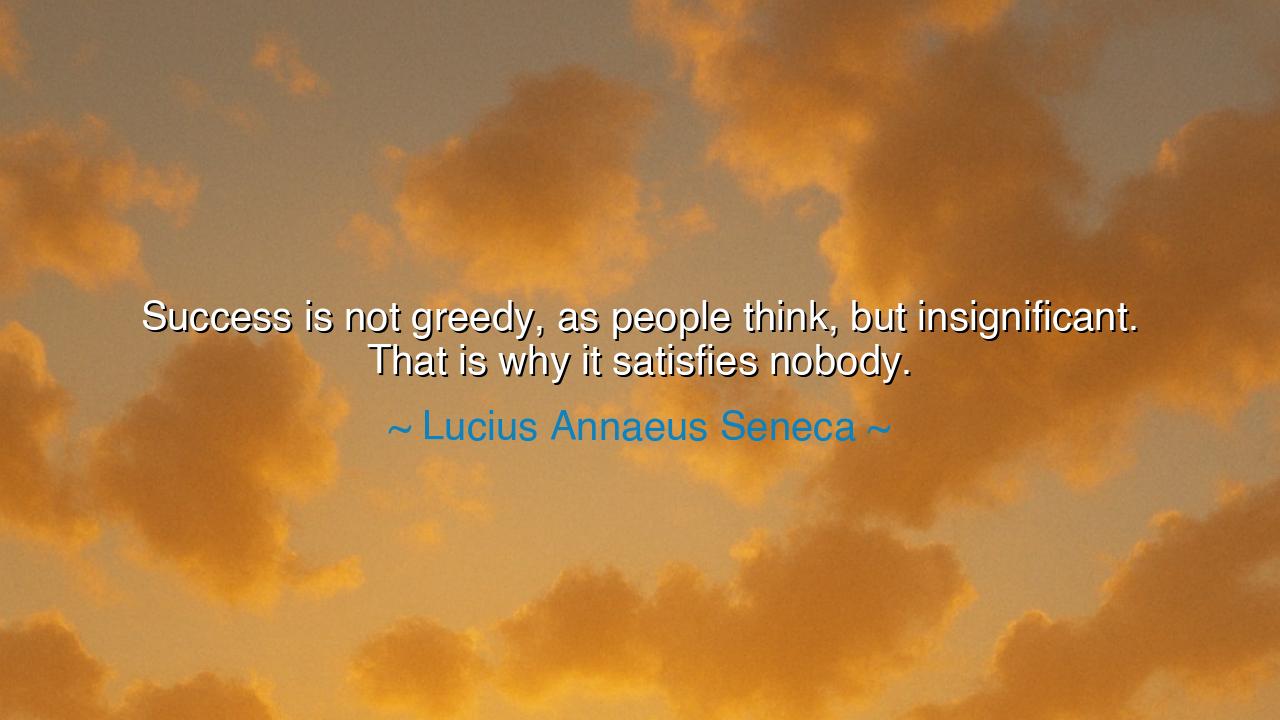
Success is not greedy, as people think, but insignificant. That
Success is not greedy, as people think, but insignificant. That is why it satisfies nobody.






When Seneca, the Stoic sage, proclaimed that “Success is not greedy, as people think, but insignificant. That is why it satisfies nobody,” he laid bare a truth that men have struggled to accept since the dawn of ambition. Many believe that success is a god to be worshiped, that once its crown rests upon their brow, they will know peace. Yet Seneca, who walked among emperors and saw both splendor and ruin, knew the hollowness that follows the achievement of worldly aims. He warns us that success does not devour us because it is too vast, but because it is too small—it fails to fill the cavernous hunger of the human spirit.
The origin of these words lies in the Stoic way, which teaches that the external—fortune, wealth, praise—is fleeting and fragile. Success, measured in these terms, is like a spark in the wind: it glows brightly for a moment, then vanishes into the darkness. The wise do not despise success, but they do not worship it either. They know that the satisfaction it offers is brief, and that true fulfillment must be sought in virtue, wisdom, and the mastery of the soul. Thus, Seneca speaks not to scorn triumph, but to reveal its limits.
Look to the life of Alexander the Great, whose victories shook the earth. He conquered nations, built empires, and laid claim to half the known world. Yet at the edge of his dominion, he wept, for there were no more lands to seize. His success was absolute, yet his heart was restless, for the flame of conquest could not quench the deeper thirst of the soul. In this way, Alexander is proof of Seneca’s words: the insignificance of success is revealed in the emptiness that follows its attainment.
So too in Rome itself, emperors bathed in glory but perished in despair. Their monuments still stand, but their hearts knew no peace. They mistook applause for meaning, and power for fulfillment. The crowd’s cheer filled their ears but left their souls barren. For the truth is this: success is a shadow, not the substance; it is the echo of effort, not the eternal reward. That is why it “satisfies nobody”—because man is not made for shadows, but for light.
The wisdom of Seneca calls us to turn inward. If success cannot feed the soul, then what can? The Stoics teach that it is virtue, the alignment of one’s life with reason, courage, and justice. It is the pursuit of wisdom, not the pursuit of crowns, that gives man true greatness. A single act of kindness, a moment of integrity, a life lived in harmony with truth—these endure longer than empires, and they satisfy deeper than victories.
From this, let us draw a lesson for our own time. Do not chase after success as if it were the answer to all hunger. Pursue it with diligence, yes, but know its limits. When you achieve it, do not be surprised if the joy fades quickly. Instead, anchor your life in deeper pursuits: love that is given freely, virtue that is practiced daily, wisdom that is sought tirelessly. These will not leave you empty.
Practically, this means pausing when you achieve something and asking yourself: “What does this serve? How does this honor my soul, my family, my world?” If the answer is shallow, then know that the fleeting satisfaction of success will soon depart. Redirect your energy toward what lasts—building character, serving others, and seeking truth. In this way, even the smallest victories will carry eternal weight.
Thus, Seneca’s wisdom stands as a pillar for all generations: do not be deceived by the glitter of success. It is not greedy—it is simply too insignificant to satisfy the vast hunger of the human spirit. Look higher, live deeper, and anchor yourself in what endures. Only then will you drink from the well that never runs dry.






AAdministratorAdministrator
Welcome, honored guests. Please leave a comment, we will respond soon